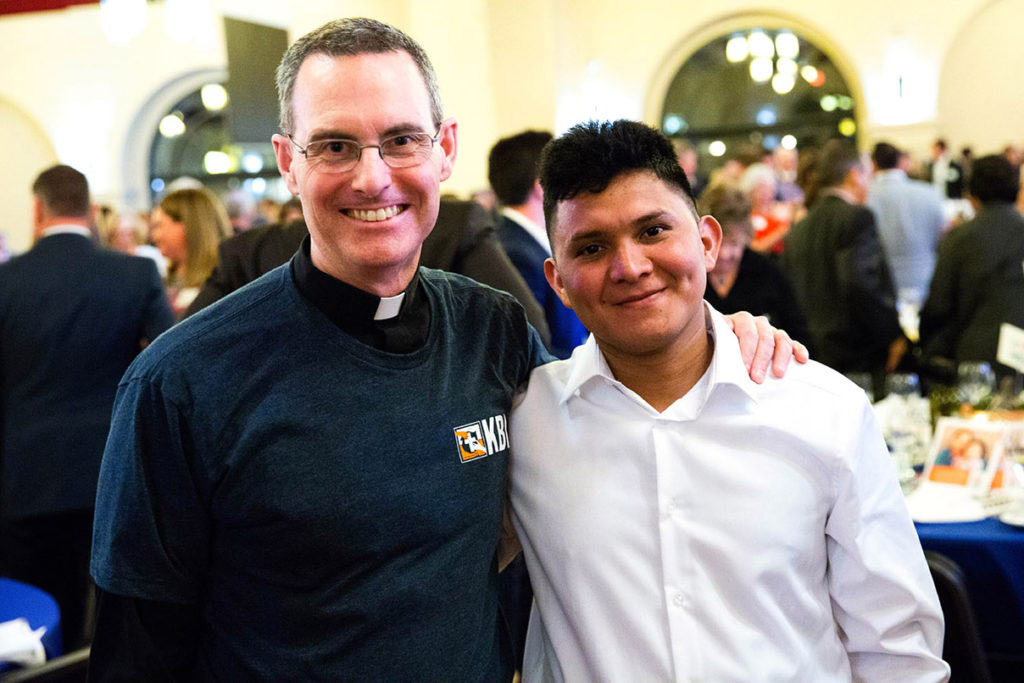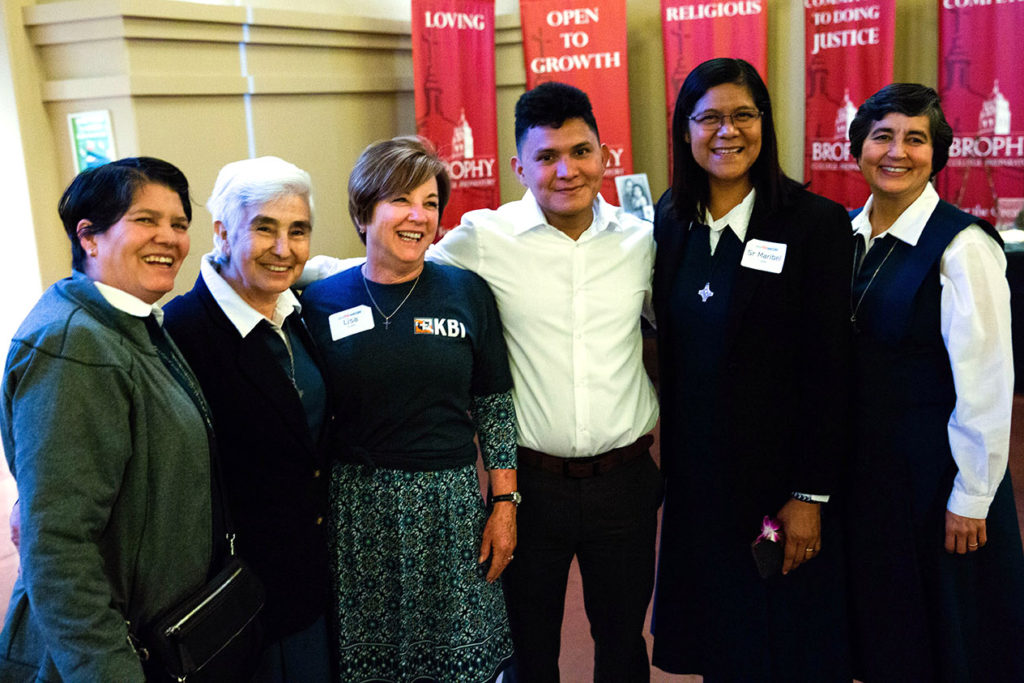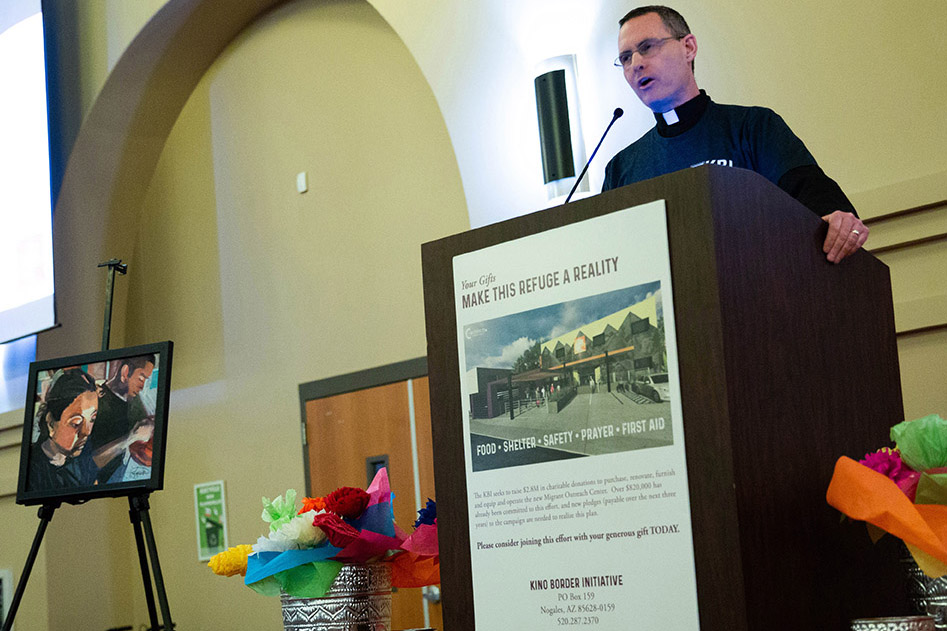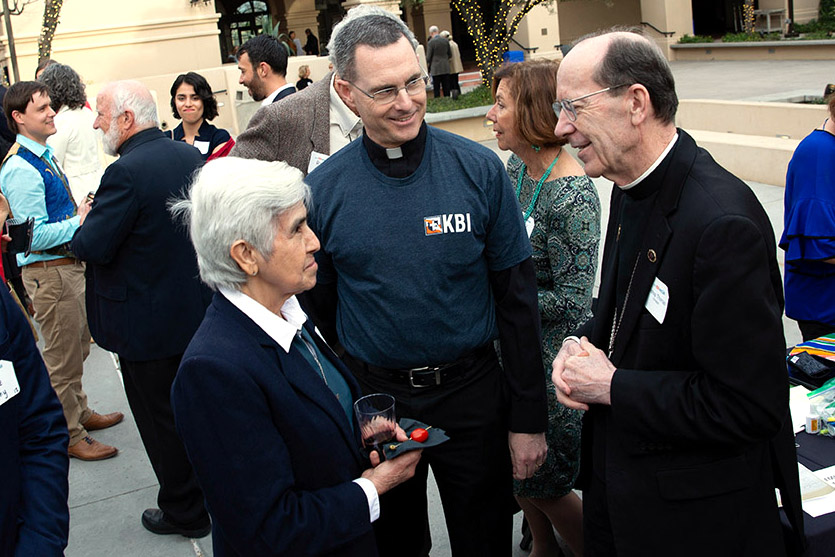

Fredys Sevilla remembered “nights and days of many nightmares” as he was forced to leave his native Honduras because of the gang violence there.
“I either had to commit suicide or be slave of drug traffickers,” Sevilla shared with a crowd of more than 425 people attending the ninth Annual Kino Border Initiative (KBI) Dinner March 9 held at Brophy College Preparatory.
The dinner gathered together friends of the initiative, those interested in finding out about their ministry, and also raised almost $200,000 for the group’s aid, education and advocacy programs, before additional funds came in through an auction.
Based on both sides of the border in Nogales, Arizona, and Nogales, Sonora, Mexico, KBI provides direct humanitarian assistance and accompaniment with migrants, social and pastoral education with communities on both sides of the border; helps those deported to Nogales, Mexico; and helps migrants from Central American countries traveling north with hopes of reaching the United States.

Sevilla first greeted the audience in broken English then recounted his journey in Spanish allowing a translator to fill in the gaps for those who needed it. He expressed gratitude for being able to leave Honduras and that God helped him on the journey through Mexico where he underwent “many nights without sleeping, many days without eating, but thanks to God everything turned out OK,” he said. He did encounter some volunteers who gave him food along the way, however.
Another hardship: a ride on the famous “Beast” train through Mexico due to the presence of the cartels in that country and having no other choice of transportation. Riding on this network of trains has proved to be very dangerous to migrants. When he arrived in Nogales, Sevilla said he was very dirty and “really tired,” breaking into English which evoked laughter from the audience and might also have released some tension.
“But I here, now,” said Sevilla, with the audience breaking into applause.
When in Nogales, Sevilla heard from a friend of the KBI dining room, called the “Comedor” and he went there very tired and hungry. “But they gave me hope, which was very important for me,” said Sevilla through the translator.
KBI assisted Sevilla in his process of seeking asylum in the United States with legal help, a bond payment and a sponsor family. He stated the KBI is not just a group in Mexico but “it’s all of you,” referring to the attendees. “Thank you for saving life,” said Sevilla in broken English and then in Spanish.

Lisa and David Grant were his “life savers.” They sponsored Sevilla, then 24, during his asylum process into the United States.
“He has been such a blessing to our lives. He’s really taught us a lot about, honestly our faith,” Lisa said.
She pointed out an example that when Sevilla won his asylum case to legally stay in the U.S., she said the he was so lucky. Sevilla dismissed the notion of luck, instead pointing upward.
Also during the evening, four members of the Missionary Sisters of the Eucharist were presented with the Pope Francis award from the organization, for their dedicated service to the people served by the initiative.
“I see what they’re carrying, I see what’s inside them. I see the fear that they’re experiencing as they flee,” reflected KBI’s executive director Jesuit Father Sean Carroll during the dinner. “I see the hunger and the thirst that they’ve experienced along the way. I see their uncertainty about what’s next about the asylum process, about whether they can find safety and support.

“But also as I look at their faces I do see strength, I do see peace, and I do see the fruit of this ministry.” Fr. Carroll then gave an update on the development of the new migrant center facility.
Dr. Maria Chavira, chancellor of the Diocese of Phoenix, shared with The Catholic Sun the importance of supporting the dignity of the immigrants.
“It was a really fun evening to get together and be in solidarity with our brothers and sisters across the border,” she said.
Fr. Fred Adamson, vicar general of the diocese, spoke of the human effort just to meet basic needs such as food, clothing and shelter.
“At the heart of it, the Kino Border Initiative is to be the face of Christ, to really be the compassion, the care, the love in a real way at the border,” said Fr. Adamson.





